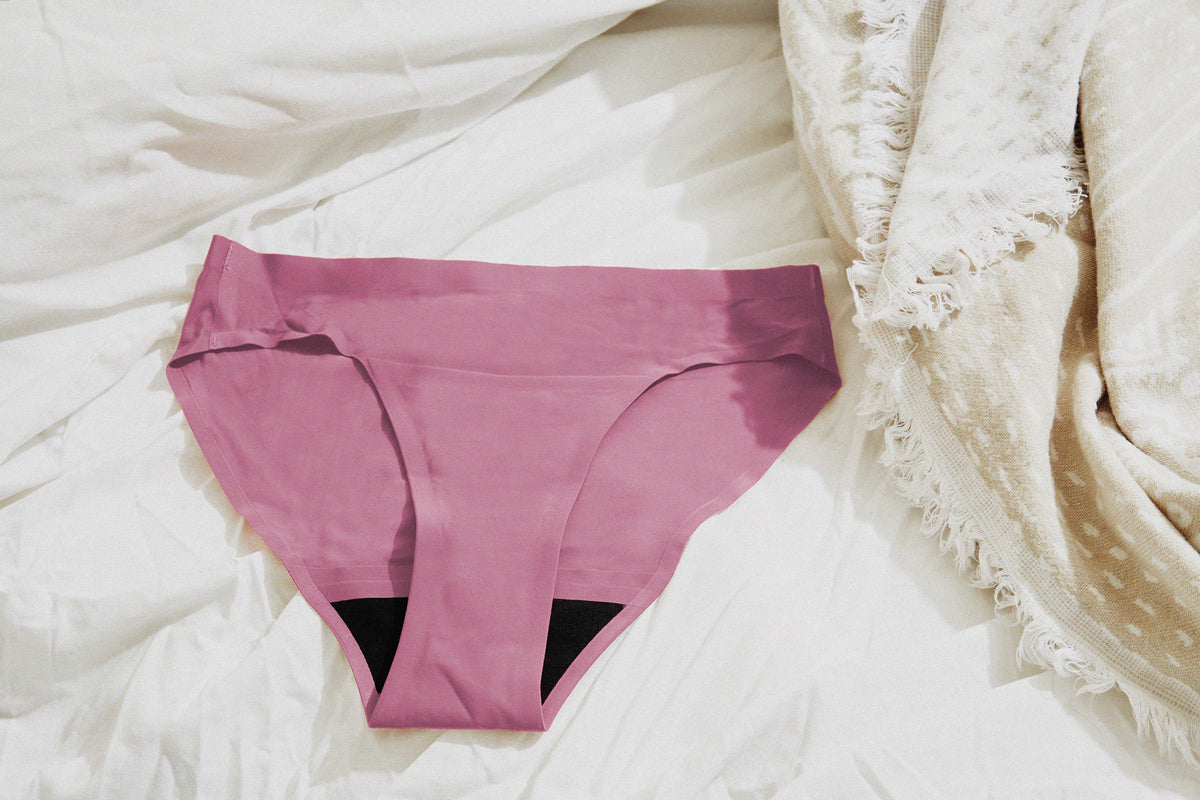PFAS and Period Pants: Are They Safe?

If you're someone who menstruates, chances are you've heard about the toxic chemicals found in period products recently. If you missed it, there's an ongoing investigation into PFAS (perfluorinated alkyl substances) being used in period underwear by some brands. We feel it's important to share our position on PFAS and whether they are present in fluxies period pants.
What are PFAS?
Per- and polyfluorinated alkyl substances, or PFAS, are a large group of chemically manufactured compounds made up of carbon and fluorine atoms. The strong bond between carbon-fluorine causes PFAS to have non-stick qualities that make them water and stain resistant. These chemicals were introduced into consumer products in the 1950s and are now found worldwide in many different items, including drinking water, some foods, nonstick frying pans, sanitary towels, food packaging, stain-resistant fabrics, cleaning supplies — even microwave popcorn bags! The problem with PFAS is that unlike other substances, they do not break down in the environment when exposed to sunlight or air — so it takes years for them to degrade naturally after being introduced into our bodies through ingestion or inhalation. This is why they are often referred to as 'forever chemicals'. The good news is that most commercial laboratories can test products to establish whether PFAS is detectable.
Why is exposure to PFAS potentially dangerous?
Once in the environment — or your body — PFAS cannot break down easily. They accumulate over time, and growing scientific evidence has associated PFAS exposure with increased risk of health effects, including infertility, children's developmental delays, high cholesterol, thyroid disease, liver damage, weakened immunity, hormone damage, and cancer.
Where are PFAS found?
Hundreds of studies have been written on the presence of these chemicals in products, and there is growing evidence that these compounds are present in most everyday household items.
The most well-known items containing PFAS include:
- Food packaging/wrappers
- Sweet wrappers
- Unfiltered drinking water
- Certain foods
- Shampoo and conditioner
- Water resistant clothing
- Microwave popcorn bags
- Eye make-up
- Paints, sealants and varnishes
- Cleaning products
- Nail varnish
- Dental floss
- Sanitary towels and tampons
- Non-stick cookware
- Pesticides
- Stain resistant clothing
How can you avoid PFAS?
Because PFAS are so prevalent in our environment, it can seem like there’s no way to avoid them. But that’s not true—there are things you can do to minimise or avoid these chemicals altogether.
- Change your diet — avoid trans fats and processed foods. Some types of meat (especially liver and other organ meats) and dairy have been found to have higher levels of longer chain PFAS. Some studies suggest that a whole-food plant-based diet can decrease the risk of consuming PFAS.
- Choose companies that test for PFAS and pledge not to use them, so you can feel confident about what you're buying.
- Do not use non-stick cookware or other items that use similar materials, because they can leach harmful chemicals into your food (and body).
- Avoid clothing treated with stain-repellent or water-resistant applications.
Do fluxies products contain PFAS?
At fluxies, we have always focused on creating products that are safe for the environment and end-users (you!). We partner with manufacturers that regularly carry out testing, and in addition, we conduct independent, third-party testing by UK company Bureau Veritas. We are pleased to report that no detectable levels of PFAS have been found in fluxies period underwear.
Since launching in 2018, we have never added stain-resistant or water-resistant chemicals to our products. Instead, we choose fabrics with inherent moisture wicking, absorbing, and leakproof qualities, so they don't need chemical treatments which can contain PFAS.
We also choose fabrics that come with STANDARD 100 by OEKO-Tex® certification, which means they are tested for over 100 harmful toxins and chemicals, including known human carcinogens like heavy metals, pesticides, and flame retardants. OEKO-TEX® recently made changes to their certification and this will now include PFAS to be non detectable/at safe levels from the first quarter of 2023.
What does 'PFAS-free' actually mean?
As a consumer, it’s important to understand that the idea of PFAS-free products is technically impossible due to the millions of different types of per-and polyfluoroalkyl substances and fluorines existing at tiny microscopic levels in everyday life. PFAS are found in nearly everything, from carpets and furniture to cleaning products and cosmetics—and even water and food.
According to growing scientific research, there is essentially no way of avoiding some (or trace) levels of PFAS, due to their 'forever' quality. Given this, you should be wary of brands that claim their products are simply 'PFAS-free'.
Instead, you can check whether a product has been independently tested and find out whether the level of PFAS present is undetectable, low, or high. Hundreds of studies have been written around which levels of PFAS are acceptable in consumer products, and how these levels are set.
How do you test for PFAS?
The only way to efficiently test for PFAS is through independently established, accredited professionals. Independent laboratories will take product samples and then run through various tests, using different methods and instruments to identify these chemicals. If the levels are high enough to be dangerous, the product will 'fail' the test, and if the levels are low enough or undetectable, the product will 'pass'.
Are period underwear safe?
The bottom line? If you're concerned about PFAS exposure from your period underwear, we recommend you do your research and only choose to purchase from companies that conduct independent tests by established, accredited professionals. We'd also recommend sticking to brands and companies that hold recognised worldwide certifications, such as OEKO-TEX Standard 100. If a company has not done any testing on their products, it might be best to shop somewhere else until they do.
At fluxies, we are committed to safety and transparency. Testing for PFAS will always remain part of our standard procedure, and we always invite you to get in touch with any questions you may have at any time!
- Tags: Periods



